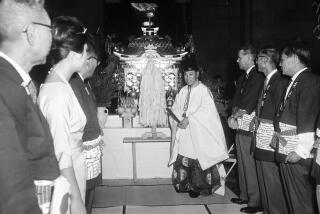Give us our space
- Share via
Today’s public (but not really public) Staples Center memorial service for Michael Jackson, with its vouchers, tickets, wristbands and attempted EBay resales, sums up much of the tackiness and tragedy that accompanies media stardom in the early 21st century. It also says something about Los Angeles and its ambivalence about public space.
The problem is not that tickets are required for the program at Staples and the Nokia Theatre. They’re free, after all, and there’s no way any chapel, cathedral or arena could accommodate Jackson’s grieving admirers without some kind of winnowing and control. But in the space between the two venues at LA Live, which overly enthusiastic backers once claimed would be the Times Square of Los Angeles, the public will be barred. In addition, streets adjacent to the taxpayer-subsidized complex will be closed.
Many of the world’s great cities have gathering spots where people come together to share triumph or loss or a sense of community. It might be Grant Park in Chicago, where Barack Obama addressed thousands of people (ticketed and otherwise) on the November night he won the presidential election. It might be Central Park in New York, where grieving fans gathered to remember John Lennon in 1980, or the National Mall in Washington, where millions have come together over the decades for observances and celebrations of all kinds.
In Los Angeles, it seems we have only the street. That’s where you go to celebrate the Lakers or to demonstrate for immigration reform. But this time, even the streets will be closed. Concerns about security and safety are understandable. Still, amid an almost lockdown atmosphere, Angelenos who want to be present at a public memorial for a pop icon are being directed to instead stay home, turn on the TV and watch from the couch.
This isn’t the first time the city has confronted the public dimension of a semi-private event, and it’s hardly the first time anyone was irritated over whether taxpayers should foot the bill. Should we pay to put police outside the Oscars ceremonies, for example, and enjoy the resulting boom for nearby businesses, or should we refuse to subsidize the wealthy entertainment elite? Host a political convention, or leave well enough alone? Pay to police the Lakers victory parade, or tell the team to celebrate somewhere else?
In the past, the people who paid for the streets to be patrolled could still gather along them to be part of the moment. Not this time. The Jackson memorial may signal that Los Angeles’ civic space, instead of expanding as once promised, is just withering away.
More to Read
The biggest entertainment stories
Get our big stories about Hollywood, film, television, music, arts, culture and more right in your inbox as soon as they publish.
You may occasionally receive promotional content from the Los Angeles Times.










